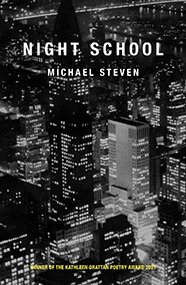Review: Night School
Reviewed by: Dan Rabarts
Author:
Michael Steven
Publisher:
Otago University Press
ISBN:
9781990048340
Date Published:
29 April 2022
Pages:
84
Format:
Paperback
RRP:
$25.00
All books bought via this link help us to review more books from Aotearoa — thank you for supporting local books and authors
Michael Steven’s Night School reads like a nostalgic time-travelling acid-soaked road-trip, formed of fragments of clarity that stab sharply out of the haze of the years between hits.
The aptly-named collection captures a nocturnal education, the pitfalls and illicit highs of misspent youth, with a finely measured balance of wistfulness and regret as the author looks back on the misdeeds of his younger self and the world he traversed to get to where he is today – not that we can be sure, with any certainty, where that is.
Rites of passage feature, as the poems make their way through adolescent discoveries of sex and parental failure in The Picture of Doctor Freud, to questionable role modelling that may have delivered some valuable poetic influences in Dropped Pin: Maramarua, East Waikato: My uncle gave me booze, word music. / He kept leatherbound volumes of verse / in a low cabinet beside his Johnny Walker.
Winter Conditions offers itself as the centrepiece of the collection. It’s a powerful study of industrialised desperation, the search for something meaningful in a world defined by rules that undermine individuality and the rare preciousness of love amidst the clamour of a world to which so many subscribe but in which so few are ever really happy: Ebb of the blood tide running through our days. / Love dwindled below us to metaphor. / …Nihilism was chic in the decade we came up in. /…/ your hand trembled into place on my thigh
Because of solid pieces like this, works such as the Strains series - each of which explores the context and influence of different strains of marijuana on liminal swatches of time and space in the poet’s mind’s eye - stand on their own as valid and worthy of the reader.
Connections are drawn through the poems like smoke weaving through a bodega, laced with aromas that one moment turn the gut and next moment draw an ache for something more. The drug culture of the 90s and beyond did not emerge out of a vacuum but as a consequence of many factors along the way: We wanted all we could of a world / beyond the streets of our dim suburb. / Here I wept on acid for my fractured family. (Dropped Pin: Trinity Wharf, Tauranga)
Steven invites us to step into these fragments of time and experience some hint of those lost days, like a dreamer trying to reconstruct pieces of something gone yet not forgotten but not for memory’s sake alone.
The body of confessional imagery that accumulates around the Dropped Pins series, capturing times and places and what happened there and to whom, creates a shared understanding between poet and reader that sometimes life is not about consequences of actions but that actions can also be the consequences of life. That we are the product of the forces that shape us: …the father, / sitting alone… / unable to name the emptiness inside him, / the same emptiness his father endured / before him and was unable to name. (The Gold Plains)
Death and suffering show themselves all too often because for all the smoky justification we might wrap around our choices, choices equal outcomes. Nevertheless, the final rim of light that cuts across this collection at some of its darkest moments is bright enough: there is always hope. If we can see the big picture through the details, we can find a way forward: the junctures of art, love, sex and poetry: / everything passes through the eye of a needle (Dransfield in Darlinghurst).
Hazy as weed smoke yet sharp as a razor blade, Night School will take you on a fractured journey, will show you the faces of ghosts and lost souls, will draw bloody lines all over your map and then ask you for change for the bus. And when you’re done, you’ll turn around and do it all again.
Reviewed by Dan Rabarts



